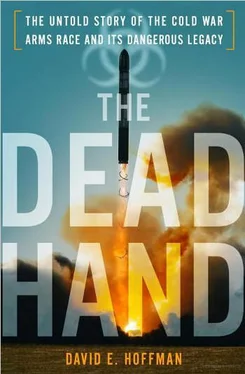Although Crowe feared he would lose his job, he decided to speak up at the White House National Security Planning Group meeting October 27. It was unusual for a military man to rise at such a meeting, but Crowe delivered a four-page statement. “Mr. President,” he said, “we have concluded that the proposal to eliminate all ballistic missiles within 10 years time would pose high risks to the security of the nation.” This was a bombshell—the nation’s top soldier telling the president he had risked the nation’s security by giving away too much. Crowe waited for the reaction. 9
“Admiral,” the president said, “I really love the U.S. military. I have always loved it. Those young men and women do a wonderful job for our country, and everywhere I go I tell people how proud I am of our armed forces.” The meeting ended.
“If the president was angry, it was not obvious to me,” Crowe recalled later. “If he had heard my remarks, it was not obvious to me. If he simply did not wish to respond, that was not clear to me either. Nor did I know where the controversial proposal stood now.” Reagan had not only heard Crowe, but thought he had answered him. That night in his diary, Reagan wrote, “The Joint Chiefs wanted reassurances that we were aware of the imbalance with the Soviets in conventional arms & how that would be aggravated by reduction in nuclear weapons. We were able to assure them we were very much aware & that this matter would have to be negotiated with the Soviets in any nuclear arms reduction negotiations.” 10Once again, Reagan kept his eye on the very big picture and blithely skipped over the unpleasant details.
On November 4, Republicans lost the Senate majority they had held for six years. And in the weeks and months that followed, Reagan was engulfed by the biggest scandal of his presidency. The Iran-Contra affair centered on secret operations, run in part out of the White House National Security Council, in which the United States sold missiles and missile parts to Iran to secure the release of American hostages in Lebanon, and then diverted some of the proceeds from the arms sales to help the Nicaraguan contras, circumventing a ban on aid imposed by Congress. The scandal went to the heart of a contradiction in Reagan’s thinking. In rhetoric, he stood tall on principles and pledged never to make deals with terrorists or the states that backed them. But in private, he could be deeply moved by individual human suffering, and sold the weapons to Iran out of his emotional reaction to appeals from the families of the American captives. The diversion of aid to the contras also reflected the wild and woolly side of the CIA under Casey, which seemed eager to launch swashbuckling covert wars against communism on every continent, blatantly disregarding laws passed by Congress. The scandal caused Reagan’s popularity at home to drop suddenly in late 1986 and early 1987. His presidency went into a deep freeze.
Gorbachev was puzzled and irritated. He thought he had put Reagan in a box at the summit. He had made an irresistible all-or-nothing offer, and he was sure Reagan would come around to accept it. Gorbachev repeatedly called it the “package”: concessions on the intermediate-range missiles and on the long-range weapons must be contingent on limiting the Strategic Defense Initiative. “We will stand on this, firmly,” Gorbachev confidently told the Politburo on October 14. “We do not need any cheap tricks, only the package.” But to Gorbachev’s consternation, Reagan gave no signs of flexibility in the weeks after the summit. “What is it that America wants?” Gorbachev asked at the Politburo on October 30. “I have more and more doubts about whether we can achieve anything at all with this administration.” 11
Gorbachev also had his own troubles, especially the war in Afghanistan. 12The war had become a morass for the Soviets, and provided a fresh test of whether Gorbachev could withdraw from the military burdens he inherited. On November 13, 1986, a restless Gorbachev told the Politburo he wanted to get out of Afghanistan. “We must not waste time!” he said. “We have been fighting for six years! Some say, if we continue the same way, it may be going on for another 20 or 30 years. And this is what’s going to happen. People have raised the question: are we going to stay there forever? Or should we end this war? If we don’t it will be a complete disgrace. Our strategic goal is to wrap up the war in one, maximum two years, and pull out the troops.”
Yet, as Chernyaev recalled later, “We carried the heavy burden of Afghanistan into the new year. For all of Gorbachev’s determination to end the war… no significant steps were yet taken. And this, like the aftermath of Chernobyl, was a huge weight on all his further reform activities. It greatly restricted his freedom of political and economic maneuver, including his efforts to realize the idea of Reykjavik.” 13
Another setback for Gorbachev came on his nuclear testing moratorium. The Soviet test sites had been silent for eighteen months, but the United States refused to join, and conducted some twenty tests during the period. The moratorium was good for propaganda, but it brought Gorbachev no tangible results. The Soviet nuclear weapons establishment was eager to resume explosions. On December 18, Gorbachev threw in the towel. The Soviet Union announced it would resume testing in 1987, right after the next American weapons test. Gorbachev was discouraged by having to give up one of his cherished initiatives, and dispirited at the continued signs of backsliding by Reagan on other issues. 14Gorbachev said the Iran-Contra scandal “pushes them to do it in order to save the president.” He worried about more surprises from Reagan. “We are dealing with political dregs,” he said. “One can expect anything from them.”
In December, Gorbachev approved the new military doctrine Akhromeyev had forged, but he heard grumbling from the military. “We should not become like the generals, who are trying to scare us,” Gorbachev said. “They are already hissing among themselves: what kind of leadership do we have? ‘They are destroying the defense of the country.’ They say that Ogarkov is very upset. To him it is just give, give more. Cannons should be longer!” 15
With small steps, those around Gorbachev began slowly to reverse the secrecy and deceit so deeply woven into the hypermilitarized Soviet system. Fresh streams of candor began to run through the corridors of the Kremlin. The new thinking—honest, but still cautious—was evident in the detailed reference papers that Vitaly Katayev prepared for his superiors in the Central Committee defense department, especially Lev Zaikov, the Politburo member in charge of the military-industrial complex. The style of the typewritten reports reflects Katayev’s precision and background as an engineer: three neat columns across, often many pages long, each row addressing a new issue, or question. At the top, he typed “S P R A V K A,” or information.
On December 24, 1986, Katayev finished another spravka that showed he was candid—at least to his bosses in the system—about shortcomings in the Soviet military machine. In this document, Katayev carefully dissected the points in a speech made in San Francisco four weeks earlier by Gates, the deputy CIA director. Gates claimed that a radar station being constructed north of Krasnoyarsk, in Siberia, violated the 1972 Anti-ballistic Missile Treaty, a charge the United States had made before in the glossy annual booklet Soviet Military Power . 16The Americans claimed the station could be used for “battle management” of a nationwide anti-missile system. This was not the case. The Soviets claimed the radar was for civilian space tracking. This was also not true. In fact, it was a permitted type of radar for early warning against missile attack, but the Soviets had put it in a prohibited location. The treaty said that early-warning radars could only be built around the periphery of a country, facing outward. The Soviet leaders had put this radar station inland, 1,669 miles from the Pacific Ocean and nearly five hundred miles north of the border with Mongolia, clearly not at the perimeter. The radar antenna faced northeast, too, which was not exactly outward. The real reason it faced this way was to plug another Soviet shortcoming, a hole in the early-warning network—to watch out for American missiles coming from submarines in the northern Pacific Ocean. Katayev candidly acknowledged the Soviet violation in his spravka: “The building of the radar in the city of Krasnoyarsk indeed contradicts the Article 6b of the ABM Treaty because the antenna curtain is oriented toward the inside of the territory.” Although Katayev had admitted it internally, it was a violation the Soviets would not acknowledge publicly for more than two years.
Читать дальше












